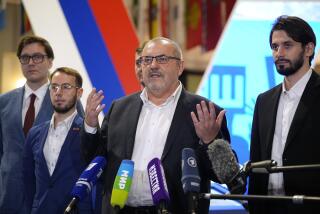Chernomyrdin Launches Bid to Succeed Yeltsin
- Share via
MOSCOW — Ousted Prime Minister Viktor S. Chernomyrdin proclaimed his candidacy Saturday for Russia’s presidential election in 2000, launching a power play that will test whether the country’s high-rolling industrialists can sell the dour but pliable bureaucrat they want in the Kremlin to skeptical voters.
Until his firing Monday, Chernomyrdin was often cast as the most likely candidate from the pro-reform camp to carry the mantle of President Boris N. Yeltsin in the next presidential contest.
But Yeltsin’s inner circle increasingly came to the conclusion that the uncharismatic Soviet-era holdover was “unelectable,” and Chernomyrdin’s dismissal was viewed as recognition by the president that he should look elsewhere for an heir apparent.
In typical Yeltsin fashion, though, he sent Chernomyrdin off with moderate praise for five years of loyal service and noted that freedom from the rigors of government work would allow Chernomyrdin to get involved in preparations for the next election.
Yeltsin gave no indication at the time whether he would support a quest by Chernomyrdin to win the presidency, and the Kremlin was noticeably silent after Chernomyrdin’s announcement in an interview with state-run ORT television.
“I have decided to be a candidate for the presidency,” the stout, jowly ex-prime minister declared without elaboration.
His lack of oratorical skill and rock-bottom reputation with the working class make his quest look at best uphill and by many accounts doomed.
But Chernomyrdin has powerful allies in Russia’s vital oil and gas industries, by virtue of a career that saw his involvement in Soviet-era Communist Party politics elevate the former plumber with a trade-school education into positions of vast authority. And those ties make him an attractive ally for the financial-industrial oligarchy that concentrates the vast wealth of Russia into a few dozen hands.
The bankers and billionaires who underwrote Yeltsin’s costly reelection campaign in 1996 see Chernomyrdin as their conduit to often-corrupt government ministers overseeing the privatization of state assets that the industrialists covet.
Even leading magnate Boris A. Berezovsky, who deemed Chernomyrdin unelectable in a television broadcast the day before his sacking, had changed his tune by Friday to leave open the possibility that the former government chief could turn around his electoral fortunes by the June 2000 vote.
“I see Chernomyrdin as a new kind of political figure in Russia, one positioned to take on the remaining tasks of the transformation,” Berezovsky said. He argued that the time for “revolutionary” moves is over and that more moderate approaches to building capitalism will probably be needed in the future.
Like the other influential oligarchs, Berezovsky was angered by former First Deputy Prime Minister Anatoly B. Chubais’ attempts to enforce more competitive rules of play in privatization after years of insider trading between government ministers and the magnates.
Chubais left the government in the same Cabinet housecleaning that dismissed Chernomyrdin, but his fellow former first deputy prime minister, Boris Y. Nemtsov, is expected to be reappointed and to carry on Chubais’ campaign for fair competition in future state share tenders.
Chernomyrdin, who will turn 60 in two weeks, is preferred by the oligarchs because they consider him one of their own. He parlayed his last Soviet government job as minister of the gas industry into the lucrative chairmanship of the state gas monopoly, Gazprom--a post he held for four years before being tapped as prime minister in December 1992.
Public officials were never required to disclose their income or assets in the wild early days of Russia’s conversion to capitalism, but Chernomyrdin is believed to be one of the wealthiest men in the country. Western media have claimed he amassed as much as $5 billion during his years at Gazprom.
Speculation that his personal fortune was ill-gotten--and at the expense of ordinary Russians--was a key factor in keeping his approval ratings abysmally low throughout his term as Cabinet chief.
*
When top government officials, led by Yeltsin, began disclosing their personal wealth to the public just before the last presidential election, in June 1996, Chernomyrdin added insult to injury by claiming an annual income of about $8,000 and only a car and small country house as personal property. Russian media quickly pointed out that his Gazprom shares and other assets were in the names of his two adult sons, who are not obliged to make public disclosures.
How then does a distrusted, unimpressive and ousted Kremlin lieutenant harbor serious aspirations to become Russia’s next leader? The example of Yeltsin’s come-from-behind showing in the last presidential contest is probably encouraging hopes in both Chernomyrdin and the rich industrialists whose assets helped their chosen candidate attain victory last time.
Yeltsin’s popularity ratings were as low as 5% just six months before the June 1996 vote because Russian troops were embroiled in a disastrous and deadly war against secessionist rebels in Chechnya. State coffers were empty, and government wages were routinely late, until Chubais rallied the industrialists behind his controversial loans-for-shares program.
Convinced that they would lose their wealth and property if Communist Party challenger Gennady A. Zyuganov won, the business leaders loaned the government millions of dollars and received shares in attractive state industries as collateral. Those stakes became the industrialists’ property when Yeltsin defaulted on the loans after winning reelection.
But Yeltsin’s reputation as a staunch reformer and his enduring charisma also contributed to his victory, in a way analysts doubt the stodgy Chernomyrdin could emulate.
The Kremlin’s indifference toward the Chernomyrdin challenge was apparent in the reaction of Nemtsov, who Yeltsin has already hinted would be his choice to succeed him.
“It’s nothing extraordinary. It’s an absolutely natural situation,” a confident Nemtsov told the Interfax news agency. “We don’t object.”
More to Read
Sign up for Essential California
The most important California stories and recommendations in your inbox every morning.
You may occasionally receive promotional content from the Los Angeles Times.














